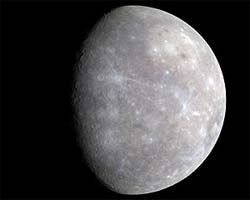NASA's MESSENGER space probe set to flyby Mercury on Monday
03 Oct 2008
A NASA space probe is slated to swing past Mercury for the second time in a flyby designed to give the spacecraft a gravitational boost that will eventually make it the first spacecraft to orbit this planet. Mercury is the planet closest to the Sun.
 |
| image: NASA/Johns Hopkins University Applied Physics Lab |
NASA sources said that they expect to collect more than 1,200 pictures when the MESSENGER spacecraft speeds past Mercury early Monday. These images are expected to reveal most of the planet's remaining unmapped terrain.
The flyby will also provide a gravity assist that will prepare MESSENGER to enter orbit around Mercury in March 2011.
"For needles with smaller and smaller eyes, this team is getting better and better," said Sean Solomon, MESSENGER's principal investigator at the Carnegie Institution of Washington, during a teleconference earlier this week.
According to Solomon, the manoeuvres are a "threading exercise" that require the highest precision as each flyby requires precise adjustments to the spacecraft's course.
These manoeuvres normally use up precious onboard propellant. For this mission, however, NASA scientists have taken advantage of the solar wind to save the spacecraft's propellant.
"MESSENGER is first interplanetary mission to use solar sailing as a means to control its trajectory," said Daniel O'Shaughnessy, the lead MESSENGER navigator at Johns Hopkins University Applied Physics Laboratory.
He also said that the mission had achieved accuracy within 1 km using "only the subtle push of sunlight and without a single drop of propellant in over six months."
The spacecraft is due to begin its 15,000 mph (24,140 kph) flyby in the early morning hours of 6 October.
The MESSENGER team has already conducted many such flybys, having revisited Earth once and swung by Venus twice since its launch in August 2004. It will conduct another flyby of Mercury in September 2009, before it finally enters orbit in 2011.
MESSENGER, short for the bulky name MErcury Surface, Space ENvironment, GEochemistry, and Ranging, will pass 125 miles (200 km) above Mercury, approximately the same distance as the first flyby on 14 January this year.
It will fly by the opposite side of the planet as compared to its first pass in January. Its instruments will cover 30 per cent of the planet surface, including never-before-seen areas on the western side. This will be the first such close look of the planet since NASA's Mariner 10 probe, which passed Mercury three times in 1974 and 1975.
The Mariner probe managed to map just 45 per cent of the planet's surface during its three flybys, while MESSENGER has already managed to map half of the planet's uncharted surface during its first flyby.
Contact will be lost intermittently, as the MESSENGER manoeuvres to take pictures and compile seven large image mosaics of the planet surface. A 17-minute power outage will also occur as MESSENGER passes into Mercury's shadow, requiring the spacecraft to rely on internal batteries instead of its solar panels.
The first MESSENGER flyby has already produced evidence that volcanoes and not impacts are responsible for Mercury's flat, smooth plains. It has also revealed that Mercury's magnetic field is elongated like a tear drop, with the solar wind pushing against the side closest to the sun and pressing it close to the surface.



















